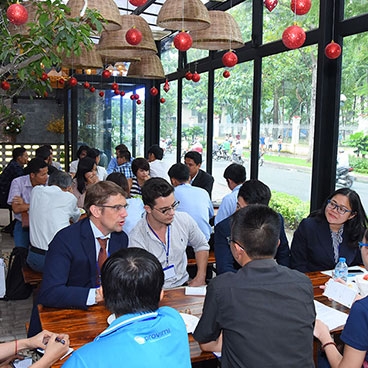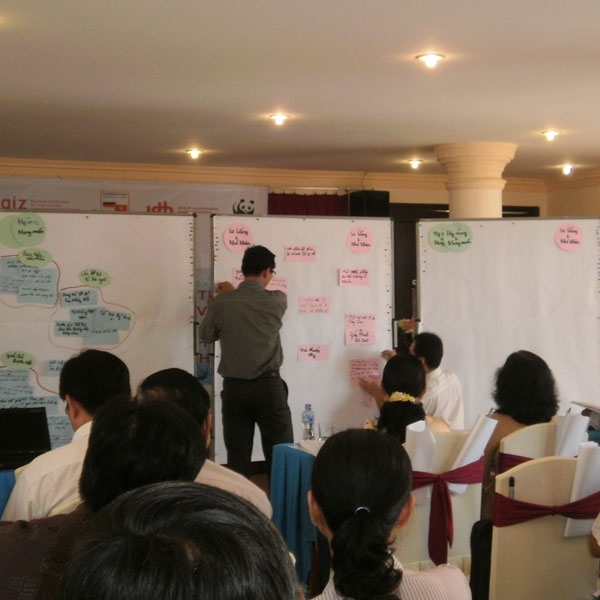Dutch feed giant Royal De Heus Animal Nutrition is to strengthen its position in Vietnam’s aquaculture sector in 2017, with the opening of a new research facility in partnership with R&D and consultancy firm Fresh Studio.
The center – due to officially open in spring 2017 – will initially focus on developing knowledge of pangasius, tilapia, snakehead and shrimp feeds. The aim is to improve the feeding performance of these species, to maximize animal growth and limit wastage of resources, Fresh Studio’s managing director Siebe van Wijk told Undercurrent News.
“We hope our work can improve efficiency, quality, and stability; that’s how we can start developing the whole supply chain, into a value chain.“
Mr. Siebe van Wijk – Director Fresh Studio
Fresh Studio began its work in the horticulture sector in Vietnam, where one of the largest supermarket chains in the world contracted it to develop direct farmer sourcing systems, he said. To ensure farmers complied with the quality standards of Fresh Studio’s client, Fresh Studio developed an extension service and an R&D and demonstration farm. “Within a period of ten years the combination of applied research, extension and cooperation with a large number of technology companies, resulted in the successful introduction of value-adding innovations to thousands of farmers.“

Based on this success, Fresh Studio’s client retailer contracted it to develop the same sourcing system for aquaculture. While developing this sourcing system, Fresh Studio too saw the need for the same applied R&D approach in the aquaculture sector, said van Wijk. De Heus, which had just made its first investment in the fish feed sector, saw the same need, and the first partnership stages were formed.
De Heus first became active in Vietnam in 2008, and completed a new factory there in April 2016. Now, two years after the partnership formed, their six hectare facility in Vinh Long Province, Mekong Delta, has an operating, indoor recirculation aquaculture system. Work on the outdoor area is being completed currently.

The R&D farm was funded through a public private partnership between De Heus, Fresh Studio and an R&D grant from the Dutch government. Links with science were made by involving Can Tho University and Wageningen University. For De Heus, this R&D facility should develop into a key innovation center for its aquaculture feed programs in other Southeast Asian nations, as well as important other fish feed markets, such as China, and Egypt. After one year of research on pangasius and tilapia, the facility is now moving into snakehead and shrimp, said van Wijk, and will branch out into feeding technology and “pure research” on feed, to “provide concrete solutions to farmers on improved feed management”.

Presenting the initiative at the “Aquaculture Innovation Challenge” in Ho Chi Minh – organized by the Seafood Trade Intelligence Portal, Solidaridad, and Fresh Studio early in December – van Wijk noted that pangasius selling prices at retail were trending downwards, while production costs have risen over the past 16 years. Hence the need for research into feed; feed costs make up over 90% of pangasius farming, and 85% of the cost of producing tilapia too.
Aside from this, poor seed quality and disease outbreaks can also eat into profits for farmers, he noted. When it comes to FRCs, a slight improvement could mean a big difference to margins. Currently salmon’s average feed conversion ratio (FCR) is around 1.1, while pangasius is 1.5 and tilapia 2.6, according to data he presented.
“There’s certainly room for improvement to get a bit nearer that 1.1 mark for pangasius, and that would mean real savings.”
For instance, working on the basis of a pangasius maket price of VND 21,000 per kilogram, an FCR improvement from 1.5 to 1.2 could mean savings of 20%, or VND 4,050/kg, he said. In turn this could lead to an upward spiral of better products and higher yields, improving demand, and ultimately earning higher prices, Fresh Studio hopes.

“We expect indirect savings also. From the farm side, because less feed will be used per pond, less organic matters will be released into the ponds which should limit both the pumping costs to exchange water, and treatment costs to cure diseases.”
From a market perspective, these improvements should be perceived positively, and may play a part in driving higher market prices in the long-term, it is hoped. By the time the official opening comes around, De Heus and Fresh Studio will announce collaborations with other key players in the aquaculture sector, who want their technologies and production systems tested and further improved, he said.
Source: www.undercurrentnews.com





